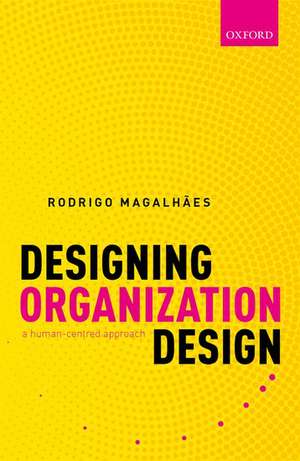Designing Organization Design: A Human-Centred Approach
Autor Rodrigo Magalhãesen Limba Engleză Hardback – 15 oct 2020
Preț: 594.24 lei
Preț vechi: 791.73 lei
-25% Nou
Puncte Express: 891
Preț estimativ în valută:
113.74€ • 123.59$ • 95.61£
113.74€ • 123.59$ • 95.61£
Carte tipărită la comandă
Livrare economică 10-16 aprilie
Preluare comenzi: 021 569.72.76
Specificații
ISBN-13: 9780198867333
ISBN-10: 0198867336
Pagini: 334
Dimensiuni: 163 x 236 x 23 mm
Greutate: 0.61 kg
Editura: OUP OXFORD
Colecția OUP Oxford
Locul publicării:Oxford, United Kingdom
ISBN-10: 0198867336
Pagini: 334
Dimensiuni: 163 x 236 x 23 mm
Greutate: 0.61 kg
Editura: OUP OXFORD
Colecția OUP Oxford
Locul publicării:Oxford, United Kingdom
Recenzii
A robust theoretical book ... a valuable read for upper-division undergraduates majoring in leadership, business management, human resources, and industrial/organizational psychology as well as management, human resources development, and business graduate students and faculty.
This is a terrific book on organization design. It starts with the premise that organizations are human constructions, purpose driven, and responsive to their stakeholders. In other words this is a practical, common-sense approach that we badly need. Scholars and practitioners will be amply repaid by reading, studying, implementing the ideas in this book.
This book argues that organization studies need a paradigm shift towards design. Design and organization were always related. However, the current 'design thinking' hype is not the answer, since it does not address the essential issues. In a broader perspective this book presents a carefully reasoned and passionately formulated plea for the urgently needed change from a market society to a society with markets, and it provides useful 'organization design logics' on how to do this.
This book addresses the urgent need to shift from thinking about organizations purely in terms of structures and systems, offering an alternative approach based on more humane and situated forms. The principles of design thinking and their implications are discussed in depth, and a wide range of literature is drawn on to address the history, current developments, and future possibilities for organization design. Each logic is discussed in detail, taking the reader carefully through its main elements, and key ideas are illustrated and integrated through helpful figures.
In this era of turbulent change, resulting from emergent technological possibilities, climate change, populism and the like, organizations need to reinvent themselves as well as their role in society. They need to reinvent the way they design themselves day after day on an ongoing basis. Although, as Magalhães points out, we are still waiting for a unified theory of organizational design, we now have a foundational book to help build such theory. Magalhães guides us in a fascinating journey through the landscapes of design as a living and polyedric process. A great organizational read.
This is a terrific book on organization design. It starts with the premise that organizations are human constructions, purpose driven, and responsive to their stakeholders. In other words this is a practical, common-sense approach that we badly need. Scholars and practitioners will be amply repaid by reading, studying, implementing the ideas in this book.
This book argues that organization studies need a paradigm shift towards design. Design and organization were always related. However, the current 'design thinking' hype is not the answer, since it does not address the essential issues. In a broader perspective this book presents a carefully reasoned and passionately formulated plea for the urgently needed change from a market society to a society with markets, and it provides useful 'organization design logics' on how to do this.
This book addresses the urgent need to shift from thinking about organizations purely in terms of structures and systems, offering an alternative approach based on more humane and situated forms. The principles of design thinking and their implications are discussed in depth, and a wide range of literature is drawn on to address the history, current developments, and future possibilities for organization design. Each logic is discussed in detail, taking the reader carefully through its main elements, and key ideas are illustrated and integrated through helpful figures.
In this era of turbulent change, resulting from emergent technological possibilities, climate change, populism and the like, organizations need to reinvent themselves as well as their role in society. They need to reinvent the way they design themselves day after day on an ongoing basis. Although, as Magalhães points out, we are still waiting for a unified theory of organizational design, we now have a foundational book to help build such theory. Magalhães guides us in a fascinating journey through the landscapes of design as a living and polyedric process. A great organizational read.
Notă biografică
Rodrigo Magalhães is a Professor of Management, currently affiliated to INESC-ID, Institute for Computer Systems and Engineering-Research and Development and to the Centre for Organization Design and Engineering, INOV, both in Lisbon, Portugal. He was previously co-Editor-in-Chief of Organization Design and Enterprise Engineering and has an extensive publishing record in the areas of design management, information systems management, organizational change, knowledge management, organization learning, business process management, and e-learning.
